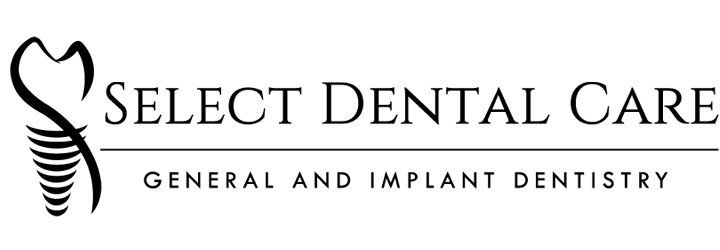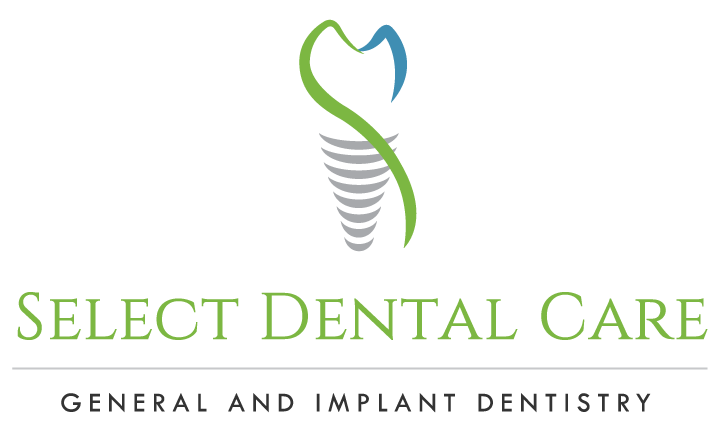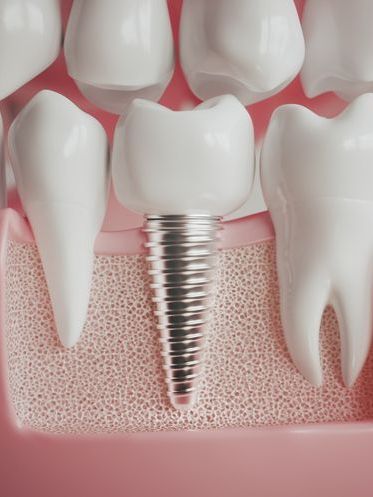
Dental Implants
Dental implants are a great alternative for natural teeth replacement. Strong and stable, they can restore a lost tooth and can look, feel, fit and function like a natural tooth. This procedure has become a popular option in dental reconstruction, with over half a million implants placed every year in the U.S. Call Select Dental Care at 954-752-9065 to book an appointment for dental implants in Coral Springs today!
Advantages of Dental Implants
- Dental implants are built to last. They provide an ideal long-term and cost-effective option when in need of dental replacement.
- A secure, comfortable fit that looks and feels natural, without the slipping of normal dentures
- Implants protect your jawbones and help preserve your natural bone against further health issues
- Dental implants allow you to maintain the natural shape of your face and smile
- Unlike removable dentures, dental implants are placed in your mouth and do not need to be removed for maintenance
- No other adjacent teeth have to be ground down or disturbed to hold an implant in place
- You can talk and eat normally without the inconvenience
- You will no longer feel self-conscious about missing teeth
The Implant Process
Before placing your dental implant, the provider may administer antibiotics, I.V. sedation, or nitrous oxide to make sure you are as comfortable as possible. Typically, a local anesthetic is used around the area of placement to numb the area.
Once you are comfortable and ready, the provider will make a small incision over the gum tissue so they can access the bone, open up the area with dental tools, and then, the implant post will be inserted in the jawbone in place of the tooth's root. Placement typically takes between 30 minutes to an hour for one implant and a few hours for multiple implants.
Healing varies for each patient, but most patients experience slight pain after the procedure. Your provider can prescribe medication and give you at-home care instructions to alleviate any discomfort or pain. Your doctor will also provide you with follow-up care instructions and appointments to ensure your implant is healing properly. Typically, it can take anywhere between three to six months for an implant to heal. An abutment/healing cap will be placed on the implant during this time to help the gum tissue surrounding your implant heal effectively. This will also help prevent infection and damage.
Once your implant is healed, the provider will create a custom-made dental crown and attach it over your dental implant.
Contact Select Dental Care at 954-752-9065 to learn more about our dental implant options.
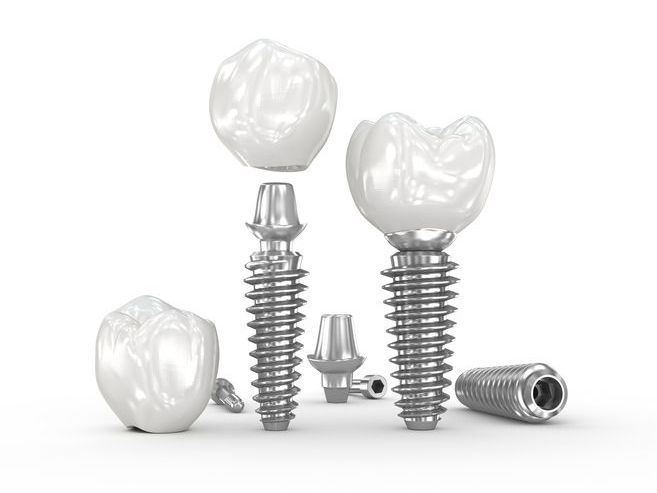
Abutment and Placement
Most implants have three pieces: the implant that goes in your bone, the abutment (or connector) that holds the tooth, and the crown tooth that attaches to the abutment.
The crown is shaped like a tooth and made to look like the others around it so that it is not obviously false. Abutments are made of different materials, most commonly titanium, but they can also be made of gold or zirconia.
-
Read More
A special type of dental cement is used to keep the crown attached to the abutment. Well made dental implants have a very tight connection between the implant and the abutment. This is important for the long-term maintenance of your bone around the implant.
The Benefits of Implant Abutments and Crowns:
- No slipping to ensure natural speech and chewing ability
- Natural appearance and feel of teeth
- Eliminating pain and discomfort that can be caused by traditional dentures or bridges
Please call Select Dental Care at 954-752-9065 for more information about dental implant abutment and crown placement. We can help restore your beautiful smile!
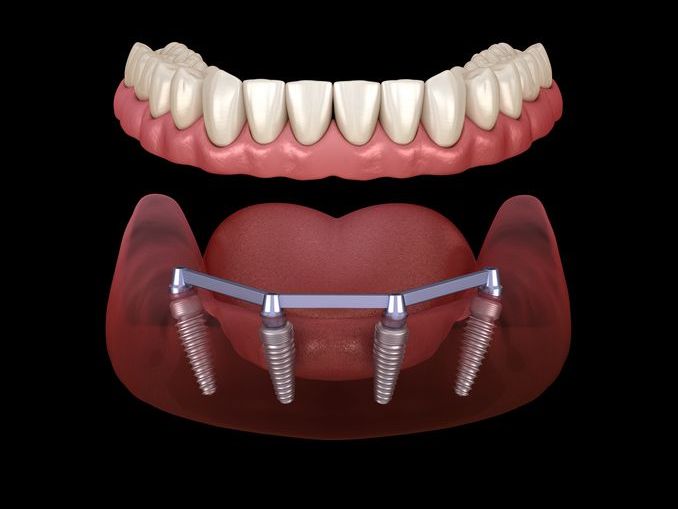
All-on-4
Here at Select Dental Care, our goal is to create healthy smiles that patients are proud to show off. For some patients, our All-on-4® dental implant restoration is the ideal solution.
With the All-on-4 process, patients who are in danger of losing all or most of their upper and/or lower teeth will enjoy durable, long-lasting replacements that function and feel like normal teeth. Best of all, you can avoid the need for loose, restrictive dentures.

Implants vs. Bridges
Dental implants are the next best thing to your healthy, natural teeth. Strong and stable, a dental implant restores a lost tooth so that it looks, feels, fits and functions like a natural tooth when implanted by your dentist. While dental implants may need periodic adjustments, they can last a lifetime when properly placed and cared for over time.
-
Read More
If you have lost one or more of your natural teeth, it is important to determine the best way to replace them. Replacing missing teeth will restore your confidence and prevent further issues like shifting of teeth, difficulty speaking, change in bite, a risk of tooth decay and periodontal disease. The two most popular options for replacing missing teeth are dental implants and dental bridges. Which option is best for you?
What are Dental Implants?
A dental implant is an artificial tooth root made of titanium. The post is inserted into the jawbone and supports a natural-looking dental crown. The post must fuse with the jawbone so it is firmly anchored in position. Once this process is complete, an abutment is attached to the post. An "abutment" is the structure that supports the crown. The dental crown is then screwed or cemented to the abutment.
What are Dental Bridges?
A dental bridge literally bridges the gap that is created due to tooth loss. A bridge is made up of two or more crowns for the teeth on either side of the gap -- these anchoring teeth are called abutment teeth -- and a false tooth or teeth in between. These false teeth are called pontics and can be made from gold, alloys, porcelain, or a combination of these materials. Dental bridges are supported by natural teeth or implants. In addition to strengthening a damaged tooth, bridges and crowns can be used to improve a tooth’s appearance, shape, alignment and dental occlusion (bite). Gaps left by missing teeth can cause the remaining teeth to shift, which can result in a bad bite. Bridges and crowns help prevent this from happening.
To find out which option is best for you, call Select Dental Care today at 954-752-9065 and schedule a consultation.
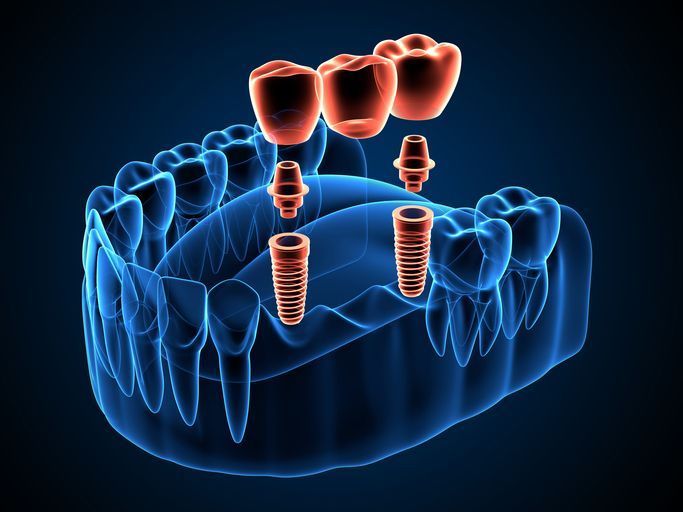
Implant-Supported Bridges
A bridge is a restoration for two or more missing teeth in a row. There are many methods for dealing with a multiple-tooth restoration, but an implant-supported bridge is often the most secure and long-lasting option. Common restorations like fixed bridges or removable partials can cause the surrounding bone to weaken because they are dependent on adjacent teeth for support.
-
Read More
However, implant-supported bridges integrate with the natural bone, providing a much stronger and more natural restoration.
The bridge is placed using just a few implants, depending on how many teeth are missing. Once the implants are placed, temporary teeth are attached over them until it is time to attach the permanent bridge. The result looks just like your natural teeth and allows you to chew and speak properly.
To find out if you are a candidate for implant-supported bridges, contact Select Dental Care at 954-752-9065 to schedule a consultation.
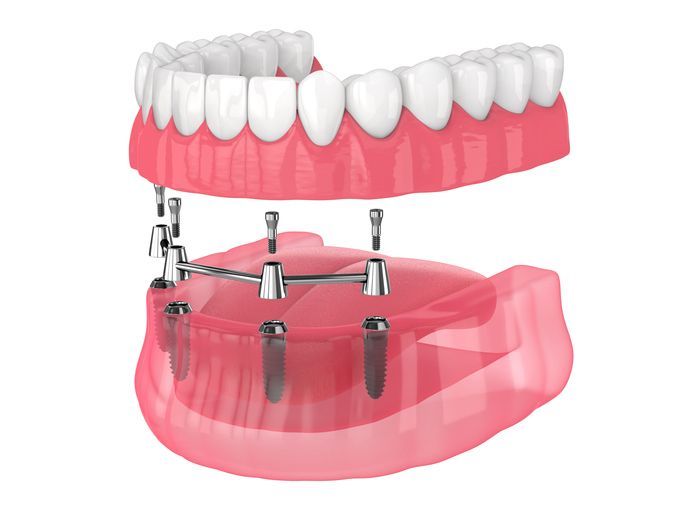
Implant-Supported Dentures
An implant-supported denture is a type of overdenture (a removable partial denture or a complete denture that covers and rests on one or more remaining natural teeth, the roots of natural teeth, and/or dental implants) that is supported by, and attached to, implants. A regular denture rests on the gums and is not supported by implants.
-
Read More
A commonly used type of overdentures, implant-supported dentures are used when a person doesn't have teeth in the jaw but has enough bone in the jaw to support implants. They utilize special attachments that snap onto the implants and hold them securely in place by anchoring them to the jawbone. These dentures can either be removable or fixed, depending on the patient’s preference and need.
Some of the benefits of implant-supported dentures include:
- No slipping
- No need for denture adhesive
- Minimal discomfort
- No palate on an upper denture, which improves eating
- Improved ability to chew and speak
To find out if you are a candidate for implant-supported dentures, call Select Dental Care today at 954-752-9065 and schedule a consultation.
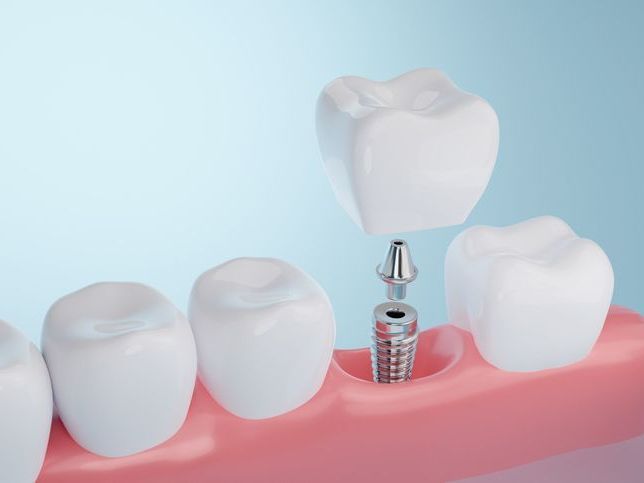
Individual Dental Implants
A dental implant can replace a missing natural tooth. The implant is made out of titanium or titanium alloys, and the crown (which is placed over the implant) is typically made from a variety of materials such as ceramics, porcelain, gold, silver, and metal alloys.
-
Read More
How are Single Tooth Implants Placed?
A dental implant is a titanium post that is surgically positioned into the jawbone beneath the gum line to replace the tooth's root. It is then topped with a crown after healing to provide the appearance of a natural, healthy tooth. If you're considering implants, you must have healthy gums and a jaw bone that is strong enough to secure and support the post.
Benefits of Individual Dental Implants
People may choose implants to replace a single tooth, more than one tooth, or to support a full set of dentures.
Single tooth implants are:
- Natural looking
- Placed quickly, in 1-2 hours
- Built to last, and with proper care, the titanium post can last a lifetime (crowns typically last 10-15 years)
- Comfortable, and may be less painful than getting multiple implants
If you're interested in individual implants, consult with your experienced provider at Select Dental Care. Schedule an appointment by calling us at 954-752-9065.

Teeth in a Day
Patients who are in need of a full upper and/or lower teeth restoration have the option to have a brand new smile in just one day. Teeth in a Day are created with dental implants, which securely hold the new teeth in place. It is an ideal alternative to dentures and gives patients a beautiful, natural-looking smile.
-
Read More
Teeth in a Day Treatment Process
The treatment process for Teeth in a Day involves an initial consultation and exam to see if you qualify for the procedure. A number of records are taken using x-rays, CT scans, photos and impressions to determine the treatment plan. The actual procedure involves placing the appropriate number of implants into the gums, which is done under anesthesia.
Next, a temporary prosthesis is placed immediately or within 24 hours of the procedure. The temporary prosthesis will stay in place for about 6 months to allow for the gums to heal and the bone to fuse around the implants. Then, a stronger, permanent set of teeth is placed and adjusted for a secure fit.
If you are in need of a full restoration and want to learn more about Teeth in a Day, call Select Dental Care at 954-752-9065 to schedule an appointment.
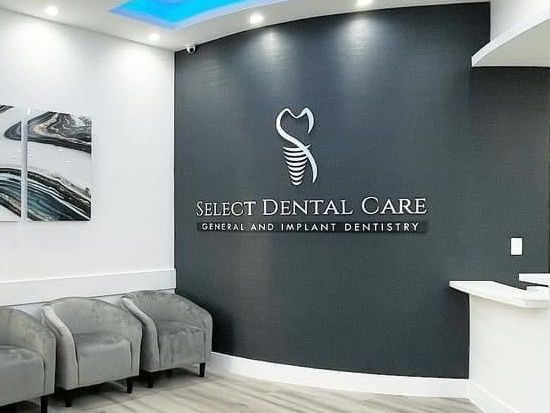
Schedule YOUR Appointment Today!
Other Things You Should Know
Are You a Candidate for Dental Implants? With the exception of growing children, dental implants are the solution of choice for people of all ages, even those with the following health concerns:
- Existing Medical Conditions: If you can have routine dental treatment, you can generally have an implant placed. While precautions are advisable for certain conditions, patients with such chronic diseases as high blood pressure and diabetes are usually successful candidates for dental implant treatment. Dental implants also offer a solution to
- Gum Disease or Problem Teeth: Research studies have concluded that implants do not lead to a high risk of gum disease or root canal issues. Also, because implants are made of titanium and other materials that are compatible with the human body, they provide a stimulus that keeps the jawbone from deteriorating.
- Currently Wearing Partials or Dentures: Implants can replace removable bridges or dentures, or they can be used to stabilize and secure the denture, making it much more comfortable.
- Smokers: Although smoking significantly lowers the success rate of implants, it doesn’t eliminate the possibility of getting them. Cessation of smoking is imperative if you are to have implants placed. You must quit smoking for good if you are to be a successful implant candidate.
- Bone Loss: Bone loss is not uncommon for people who have lost teeth or had periodontal disease. If you have significant bone loss your provider will refer you to an Oral and maxillofacial surgeon or Periodontist, who has been trained and is experienced in grafting bone to safely and permanently secure the implant.
Generally, implant tooth replacement in children is usually deferred until their jaw growth is complete. There are, however, some instances when a dental implant may be appropriate, such as when it is part of the child’s orthodontic treatment plan. If this happens, your provider can guide you in this instance.
For more information on how dental implants can improve your smile call Select Dental Care today at 954-752-9065 to schedule your dental implant consultation.
Quick Links
Patient Info
Services
Website Designed and Maintained by Xpress, INC
All Rights Reserved | Select Dental Care
